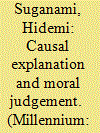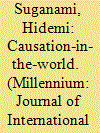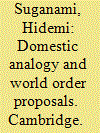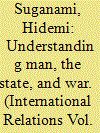|
|
|
Sort Order |
|
|
|
Items / Page
|
|
|
|
|
|
|
| Srl | Item |
| 1 |
ID:
105931


|
|
|
|
|
| Publication |
2011.
|
| Summary/Abstract |
By combining arguments about causal explanation in history found in the writings of Veyne and Dray, this article discusses one plausible line of reasoning which suggests that there is a type of causal explanation which historians offer to which their moral judgements are conceptually integral. It assesses the validity of this line of thinking and suggests that the reason why, in some cases, our moral judgements seep through to our causal explanations is not that certain concepts, such as, in particular, passivity and activity of the key actors' acts, used in our causal narratives, necessarily involve moral judgements for their application, but rather that any explanation is an answer to a question and some causal questions turn out to be, or may plausibly be construed as, asking for our moral views. The 'intrusion' of moral judgement into causal explanation is not logically necessary, but may be contextually appropriate in some cases.
|
|
|
|
|
|
|
|
|
|
|
|
|
|
|
|
| 2 |
ID:
123590


|
|
|
|
|
| Publication |
2013.
|
| Summary/Abstract |
This article examines critical realists' key contention that 'causing', or the operation of causal powers, is real or mind-independent. Against their opponents (causal idealists), they point out the (seeming) empirical obviousness of the mind-independence of causal powers, causal idealism's lack of 'ontological grounding', its 'epistemic fallacy' and so on. The validity or force of such arguments is ultimately dubious, however. Still, the understanding that causal powers are real is a necessary presupposition of scientific knowledge production and application and of our everyday thinking and practice; realists and idealists can converge on this point. Moreover, there is nothing in causal idealism as such that is incompatible with critical realists' key insight that causal laws should be understood as stating the ways things work, producing observable regularities only in closed systems and that regularities are not an intrinsic feature of causal relations. I conclude by exploring the implications of this line of thinking for the study of world politics, endorsing a move from a search for parsimonious theories that explain regular patterns observable in the international system towards a historical study of global social relations, which pays attention to causal complexes, diversity of historical contexts and the contested nature of causal interpretations.
|
|
|
|
|
|
|
|
|
|
|
|
|
|
|
|
| 3 |
ID:
034328


|
|
|
|
|
| Publication |
Cambridge, Cambridge University Press, 1989.
|
| Description |
vii, 238p.
|
| Standard Number |
0521343410
|
|
|
|
|
|
|
|
|
|
|
|
Copies: C:1/I:0,R:0,Q:0
Circulation
| Accession# | Call# | Current Location | Status | Policy | Location |
| 031146 | 327.101/SUG 031146 | Main | On Shelf | General | |
|
|
|
|
| 4 |
ID:
119988


|
|
|
|
|
| Publication |
2013.
|
| Summary/Abstract |
In his The Conduct of Inquiry in International Relations, Patrick Jackson identifies four distinct ways of studying world politics: 'neopositivism', 'critical realism', 'analyticism' and 'reflexivity'. According to him, they all fall under the broad umbrella of 'science' but they each stem from a distinct philosophical foundation. In his view, which foundation one subscribes to is a matter of faith, which leads him to advocate pluralism. He classifies the underlying philosophical foundations in terms of two criteria: 'mind-world dualism' versus 'mind-world monism' and 'phenomenalism' versus 'transfactualism'. Through a step-by-step analysis of his complex text, I show that what divides (1) neopositivism, (2) analyticism and (3) critical realism and reflexivity (classed together) is not in fact their philosophical foundations but the nature of the questions they ask, each reflecting distinct human interests. Accordingly, while praising Jackson's philosophical vigilance against the dominance of neopositivism, I conclude by pointing to a need to consider the political underpinnings of different modes of knowledge production.
|
|
|
|
|
|
|
|
|
|
|
|
|
|
|
|
| 5 |
ID:
006832


|
|
|
|
|
| Publication |
Oxford, Clarendon Press, 1996.
|
| Description |
235p.
|
| Standard Number |
019827338X
|
|
|
|
|
|
|
|
|
|
|
|
Copies: C:1/I:0,R:0,Q:0
Circulation
| Accession# | Call# | Current Location | Status | Policy | Location |
| 038816 | 355.027/SUG 038816 | Main | On Shelf | General | |
|
|
|
|
| 6 |
ID:
092036


|
|
|
|
|
| Publication |
2009.
|
| Summary/Abstract |
This article expounds and assesses the key contentions of Man, the State, and War. It notes that the book contains meta-theoretical and theoretical components. Through a close re-examination of the text, the article shows how Waltz arrives at his third-image conclusion, reveals a number of errors of a conceptual or logical nature in the meta-theoretical moves that lead him to this conclusion, and explains how such errors are partly rooted in a deeper issue that the book addresses - how to integrate the three images (or three contending estimates of the major cause of war) into one overarching image of world politics based on the agent/structure dichotomy and the distinction between macro and micro enquiries. The article goes on to outline Waltz's substantive theory of international politics, found in an embryonic form in Man, the State, and War, speculates on the sources of the book's success, and assesses its main significance.
|
|
|
|
|
|
|
|
|
|
|
|
|
|
|
|
|
|
|
|
|